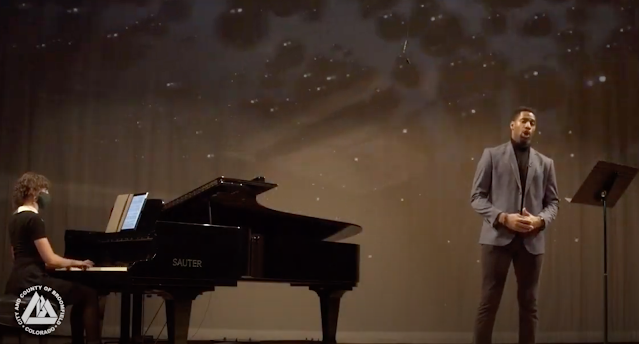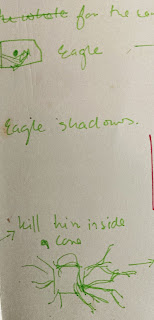Mortal Storm
"Mortal Storm, a cycle of five songs on poetry by Langston Hughes, was composed in 1965 for Thomas Carey. Having previously sung the composer's Four Motivations, Carey commissioned the work of Owens after having won First Prize in the Ard International Competition in 1963. Carey sang Mortal Storm frequently throughout Europe and the United States.
(First edition © 2012.by Classical Vocal Reprints. www.classicalvocalrep.com)
A House in Taos - projected video
Rain
Thunder of the Rain God:
And we three
Smitten by beauty.
Thunder of the Rain God:
And we three
Weary, weary.
Thunder of the Rain God:
And you, she, and I
Waiting for nothingness.
Do you understand the stillness
Of this house
In Taos
Under the thunder of the Rain God?
Thunder of the Rain God:
And we three
Smitten by beauty.
Thunder of the Rain God:
And we three
Weary, weary.
Thunder of the Rain God:
And you, she, and I
Waiting for nothingness.
Do you understand the stillness
Of this house
In Taos
Under the thunder of the Rain God?

Sun
That there should be a barren garden
About this house in Taos
Is not so strange,
But that there should be three barren hearts
In this one house in Taos —
Who carries ugly things to show the sun?

Moon
Did you ask for the beaten brass of the moon?
We can buy lovely things with money,
You, she, and I,
Yet you seek,
As though you could keep,
This unbought loveliness of moon.

Wind
Touch our bodies, wind.
Our bodies are separate, individual things.
Touch our bodies, wind,
But blow quickly
Through the red, white, yellow skins
Of our bodies
To the terrible snarl,
Not mine,
Not yours,
Not hers,
But all one snarl of souls.
Blow quickly, wind,
Before we run back
Into the windlessness —
With our bodies —
Into the windlessness
Of our house in Taos.
Rate this poem:
Little Song - projected video
Lonely people
In the lonely night
Grab a lonely dream
And hold it tight.
Lonely people
In the lonely day
Work to salt
Their dream away.
Jaime - projected video
In the lonely night
Grab a lonely dream
And hold it tight.
Lonely people
In the lonely day
Work to salt
Their dream away.
Jaime - projected video
He sits on a hill
And beats a drum
For the great earth spirits
That never come.
He sits on a hill
Looking out to sea
Toward a mirage-land
That will never be.
Faithful One - Projected Video
And beats a drum
For the great earth spirits
That never come.
He sits on a hill
Looking out to sea
Toward a mirage-land
That will never be.
Faithful One - Projected Video
Though I go drunken to her door,
I’m ever so sure she’ll let me in.
Though I wander and stray and wound her sore,
she’ll open the latch when I come again.
No matter what I do or say,
she waits for me at the end of the day.
Genius Child - projected video
I’m ever so sure she’ll let me in.
Though I wander and stray and wound her sore,
she’ll open the latch when I come again.
No matter what I do or say,
she waits for me at the end of the day.
Genius Child - projected video
This is a song for the genius child.
Sing it softly, for the song is wild.
Sing it softly as ever you can -
Lest the song get out of hand.
Nobody loves a genius child.
Can you love an eagle,
Tame or wild?
Can you love an eagle,
Wild or tame?
Can you love a monster
Of frightening name?
Nobody loves a genius child.
Kill him - and let his soul run wild.
Sing it softly, for the song is wild.
Sing it softly as ever you can -
Lest the song get out of hand.
Nobody loves a genius child.
Can you love an eagle,
Tame or wild?
Can you love an eagle,
Wild or tame?
Can you love a monster
Of frightening name?
Nobody loves a genius child.
Kill him - and let his soul run wild.
This is the complete performance.
playlist of individual tracks here
A little about Robert Owens, 1925-2017
Robert Owens was an artist of diverse gifts and accomplishments. Born in 1925, in Denison, Texas, he grew up in Berkley, California. Emulating his mother, Alpharetta Helm-Owens, a brilliant pianist, he began playing piano at the age of four, composing at eight, and performing publicly at ten. At fifteen years of age, he wrote and performed his First Piano Concerto with Berkeley's Young Peoples' Symphony, under Jessica Marcelli. After serving in the military, he continued musical studies in Paris at L'Ecole Normale de Musique under Jules Gentil and the renowned pianist Alfred Cortot, from 1946 - 1950. In 1952, his formal debut as a concert pianist in Copenhagen was met with rave reviews. While continuing to concertize and compose, Owens took Master Classes in Vienna under Professor Grete Hinterhofer from 1953 – 1957.
Robert Owens was an artist of diverse gifts and accomplishments. Born in 1925, in Denison, Texas, he grew up in Berkley, California. Emulating his mother, Alpharetta Helm-Owens, a brilliant pianist, he began playing piano at the age of four, composing at eight, and performing publicly at ten. At fifteen years of age, he wrote and performed his First Piano Concerto with Berkeley's Young Peoples' Symphony, under Jessica Marcelli. After serving in the military, he continued musical studies in Paris at L'Ecole Normale de Musique under Jules Gentil and the renowned pianist Alfred Cortot, from 1946 - 1950. In 1952, his formal debut as a concert pianist in Copenhagen was met with rave reviews. While continuing to concertize and compose, Owens took Master Classes in Vienna under Professor Grete Hinterhofer from 1953 – 1957.

After a brief teaching stint in the United States, Mr. Owens returned to Europe in 1959 to live and work in Germany. There he combined his work as a composer, pianist, and stage actor. In 1970, his first opera, Kultur! Kultur! was performed in the Ulm Opera House (in German), to great acclaim. As an actor, he is much in demand for roles such as the title role in Shakespeare's Othello, the Professor in Ionescu's The Lesson, and other major roles in Gardner's I'm Not Rappaport, Athol Fugard's Master Harold & the Boys, and Uhry's Driving Miss Daisy. These he has performed on all the most important stages of Germany.
The songs of Robert Owens are sung with regularity throughout the United States and Europe by such renowned singers as Felicia Weathers and Donnie Ray Albert. The composer has no fewer than 46 of songs on poetry by Langston Hughes, after having met the poet in 1955 and continued correspondence with him for several years. In addition, he has set poems by Emily Dickinson, Paul Laurence Dunbar, Waring Cuney, Joseph von Eichendorf, Hermann Hesse, Countee Cullen, Claude McKay, Edna St. Vincent Millay, William Wordsworth, and Emily Jane Bronté.
Owens composed and collaborated with many fine singers. He has taught at Albany College in Georgia, The University of Michigan, and Southern Methodist University. His works are frequently broadcast on Bavaria Radio and many have been recorded for Naxos, Cinnabar, and Albany record labels.
He passed away in Munich on January 5th, 2017.
Owens composed and collaborated with many fine singers. He has taught at Albany College in Georgia, The University of Michigan, and Southern Methodist University. His works are frequently broadcast on Bavaria Radio and many have been recorded for Naxos, Cinnabar, and Albany record labels.
He passed away in Munich on January 5th, 2017.











Comments
Post a Comment